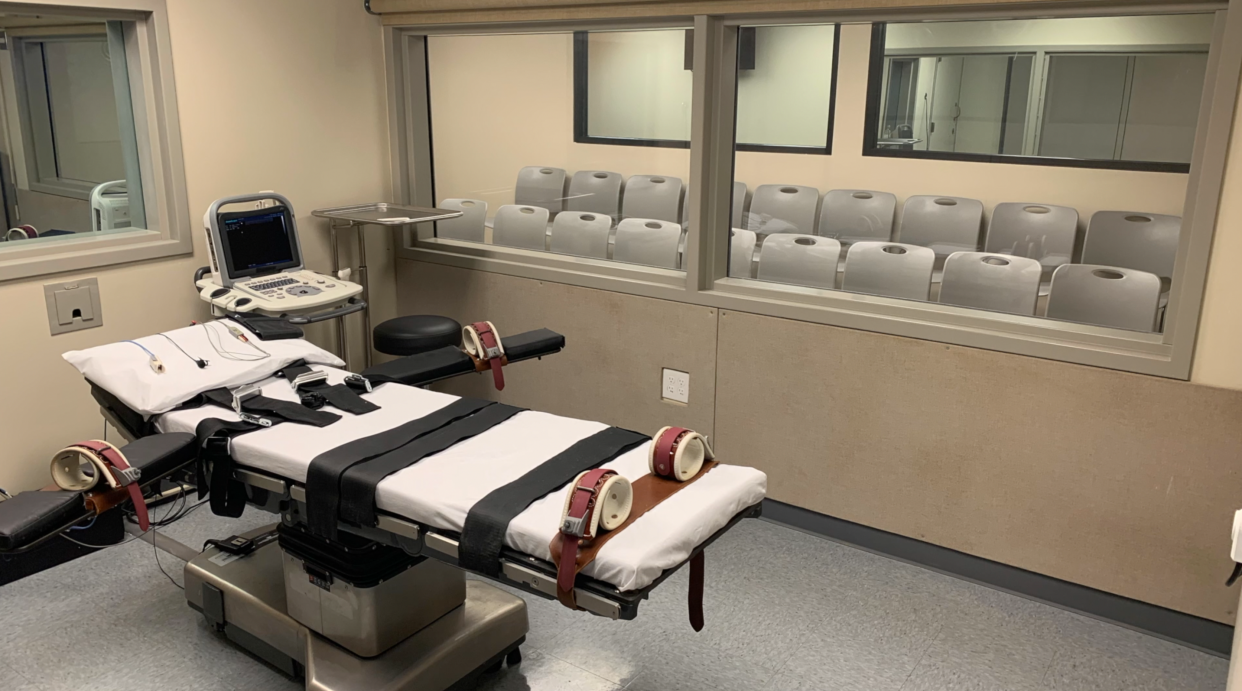Oklahoma governors have granted clemency to men facing execution before

- Oops!Something went wrong.Please try again later.
Gov. Kevin Stitt is the one person who can stop the scheduled execution of Julius Jones. Now 41, Jones has been on death row for more than half of his life for the murder of Paul Howell.
Jones has maintained his innocence, saying he was not responsible for the fatal shooting in Edmond in 1999. His family insists he was at home.
Julius Jones' story: From a murder charge to requests to commute his execution, a timeline of Julius Jones' case
More than a hundred people convicted of murder have been put to death since executions resumed in Oklahoma in 1990 for the first time in two decades. A few on death row have been granted clemency after recommendations from the state's parole board in that time, but others have not. Here's a look at those cases:
The last person to be granted clemency in Oklahoma was Richard Tandy Smith
In 2010, then-Gov. Brad Henry granted clemency to Richard Tandy Smith. He was sentenced to death for the 1986 shooting of John Cederlund during an alleged drug deal outside an abandoned farmhouse in Canadian County.
Henry made the decision almost two months after the parole board recommended clemency. He stayed Smith's execution to give him more time to consider.
Smith continues to serve his new sentence — life in prison without the possibility of parole. Henry granted clemency to death row inmates two other times during his eight years in office. He also denied clemency to three men who had it recommend (more on that below).
Brad Henry granted Kevin Young clemency
In 2008, Henry granted clemency to Kevin Young. He was sentenced to death for the 1996 shooting of Joseph Sutton during an armed robbery in Oklahoma City.
At his clemency hearing at the parole board, his attorneys argued the shooting was not premeditated and did not merit a capital sentence. They said their client turned down a plea agreement in his original trial that would have given him a life sentence.
Young's punishment was reduced to life in prison without the possibility of parole.
Brad Henry granted Osvaldo Torres clemency
In 2004, Henry granted clemency to Osvaldo Torres, a Mexican national. Torres was sentenced to death for his role in the fatal shooting of Francisco Morales and his wife Maria Yanez in Oklahoma City in 1993.
At his clemency hearing, Torres said he and George Ochoa had planned to rob the couple but that he hadn't anticipated that his partner would kill anyone.
“I never killed anyone,” Torres said. “And I never knew George was going to kill anyone.”
The case drew international attention when the International Court of Justice ruled he and others from Mexico facing execution in the United States had their rights violated.
His death sentence was reduced to life in prison without the possibility of parole. Ochoa was put to death in 2012. Ochoa's last words were, "I'm innocent."
Frank Keating granted Phillip Dewitt Smith clemency
In 2001, then-Gov. Frank Keating granted Philip Dewitt Smith clemency. Smith was convicted in the murder of Matthew Taylor in 1983 in Muskogee.
Witnesses who placed Smith at the scene later recanted and the state's parole board approved his clemency recommendation. Keating said he believed Smith probably did it but lacked "moral certainty."
Smith's punishment was changed to life in prison without the possibility of parole.
Cases recommended for clemency have been denied by Oklahoma governors
At least nine other times in the last 20 years, governors denied clemency to death row inmates.
The most recent was in 2013. The governor at the time, Mary Fallin, denied clemency to Brian Darrell Davis.
He was executed for murdering his girlfriend's mother, Josephine Sanford, in Ponca City in 2001. The parole board had recommended clemency by a 4-1 vote.
Fallin also denied clemency to Garry Thomas Allen who was executed in 2012 for killing his fiancee, Lawanna Gail Titsworth, in 1986 in Oklahoma City. The parole board had recommended clemency in 2005.
Henry denied clemency to four people convicted of murder: Donald Lee Gilson in 2009, Hung Thanh Le in 2004, Bobby Joe Fields in 2003 and Jackie Lee Willingham in 2003. All were executed.
Keating denied clemency to three death row inmates: David Jay Brown and Ernest Marvin Carter in 2002 and Gerardo Valdez in 2001.
Brown and Carter were both executed, but Valdez was not. The Mexican national was resentenced in 2003 after he complained he was denied access to a consulate after his arrest. He was resentenced to life in prison without the possibility of parole.
This article originally appeared on Oklahoman: Oklahoma executions: Governors have given clemency to men before

